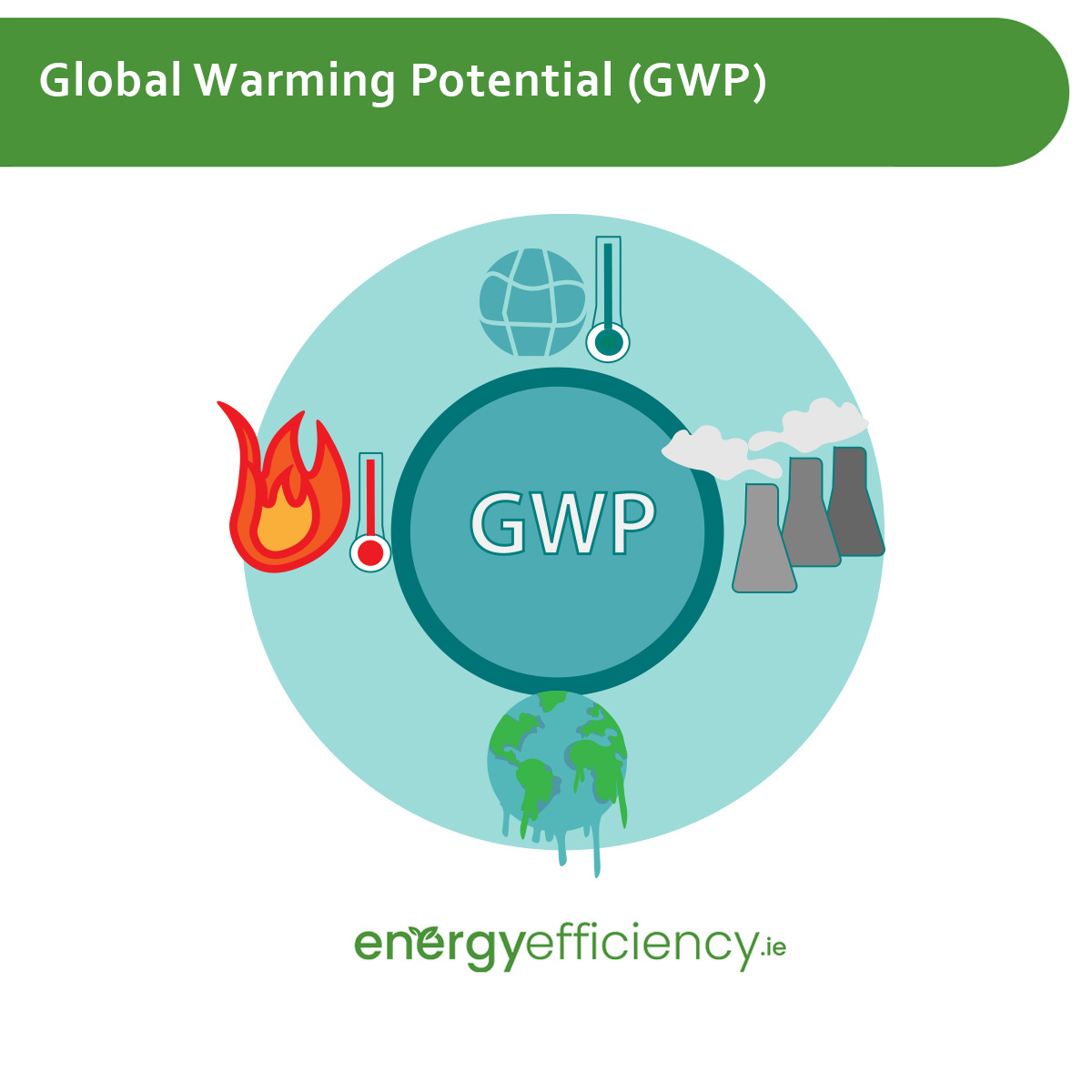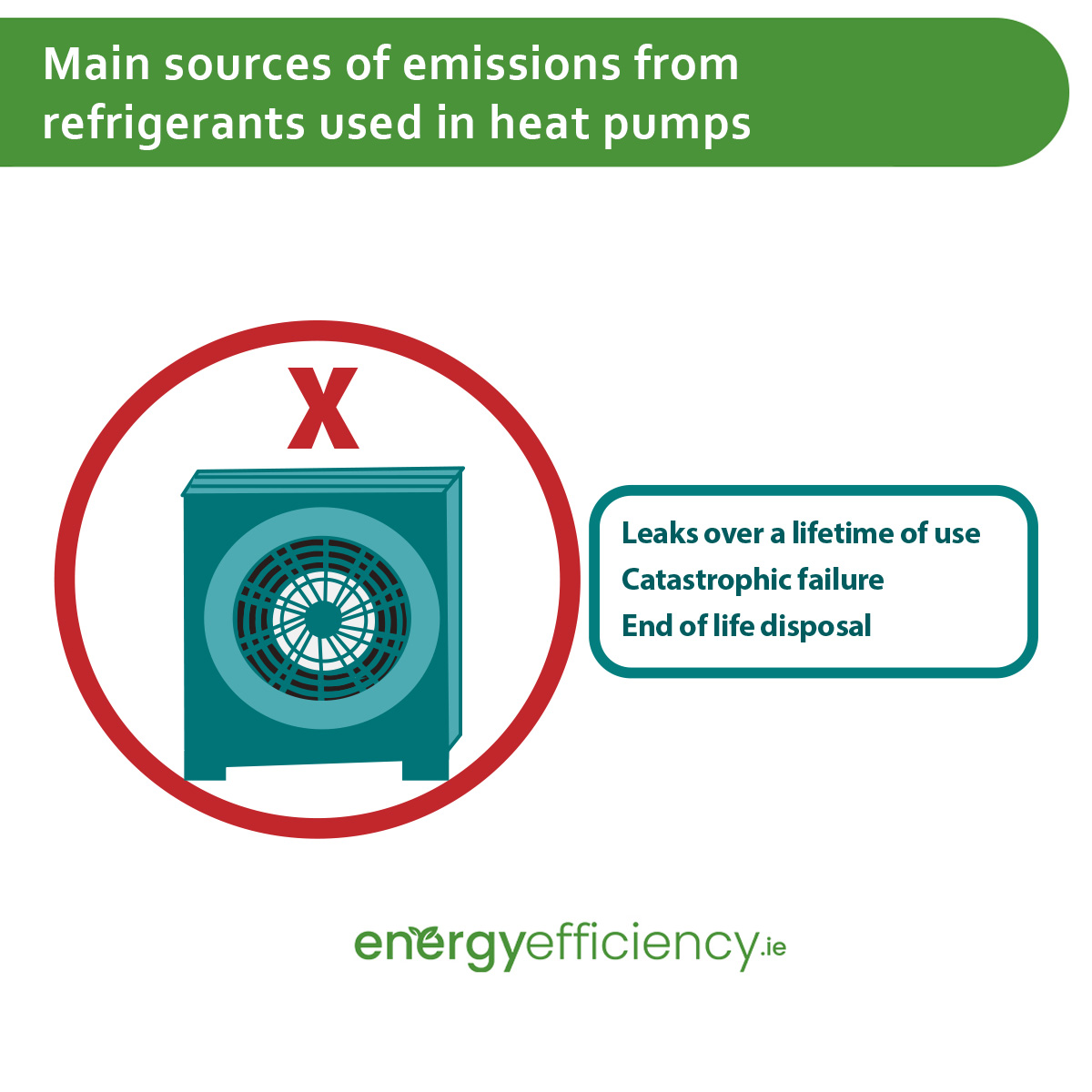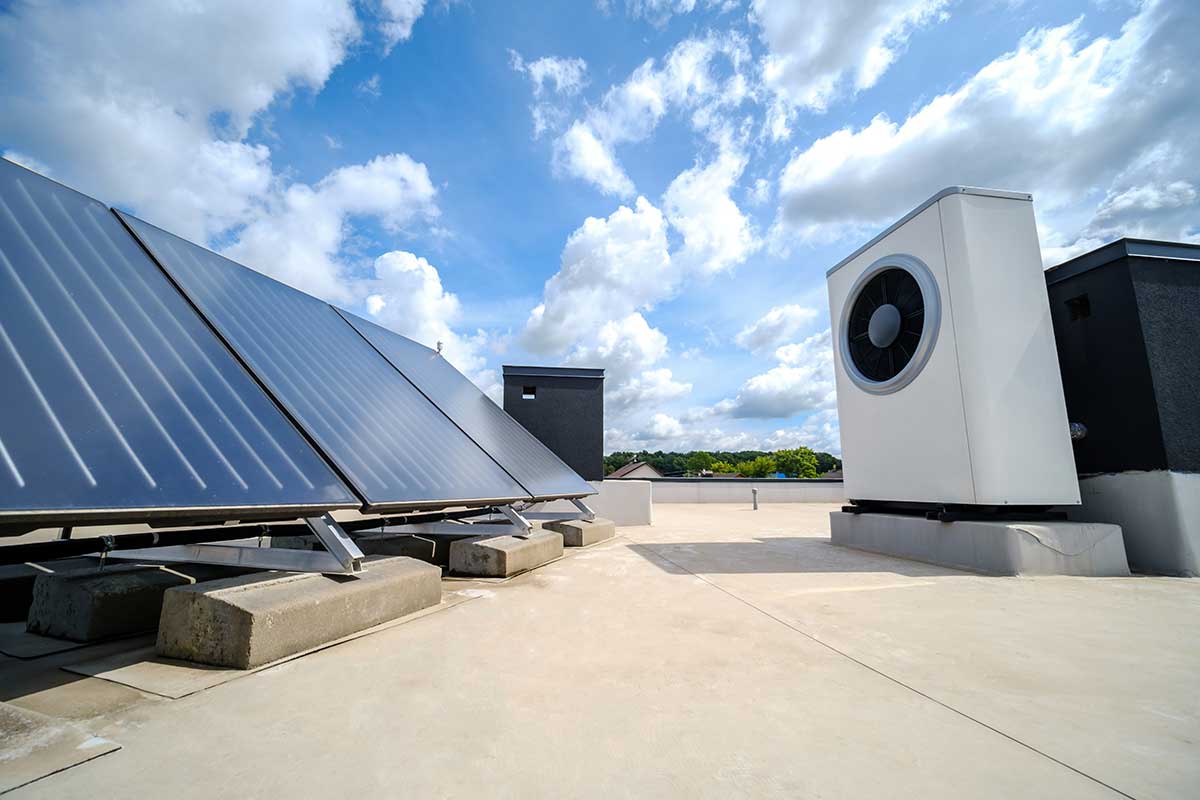Environmental Impacts of Heat Pumps

Written by: Briain Kelly
Published: April 25, 2024
Last updated: October 9, 2025
Reading time: 4 mins
Heat Pumps allow homes and businesses to generate heat from renewable energy sources, tackling a major source of Ireland’s carbon emissions and providing an environmentally friendly alternative to gas or oil heating.
Heating accounts for nearly 40% of all energy use in Ireland, with the heating in the residential sector alone responsible for 25% of energy-related CO2 emissions.
The government is pushing heavily for energy efficient systems such as heat pumps to replace fossil fuels in the coming years.
Under the Climate Action Plan, the government has set targets of retrofitting 400,000 homes with heat pumps by 2030, and installing them in 280,000 new homes to phase out fossil fuel boilers.
How Are Heat Pumps Good For the Environment
Heat Pumps use only a small amount of electrical energy to generate a great deal of heat for use inside a property. There are zero direct carbon emissions from the operation of a heat pump, with no fossil fuels burned, and only a small amount of indirect emissions.
The main sources of indirect emissions from heat pumps are the electricity used in the compressor, and the potential impacts from the refrigerant in the system.
The compressor is the component in the heat pump which compresses the refrigerant after it has absorbed the ambient energy and become gaseous. This raises its temperature to a level usable in the home.
Indirect emissions from heat pumps come primarily from the electricity used to operate the compressor, which is still mostly generated using fossil fuels.
The refrigerant is the substance which is used to absorb and transfer heat from the air or ground to the interior of your property.
The Importance of Heat Pump Efficiency
Efficiency in a heat pump is the ratio of how much heat energy is produced to the electricity consumed in its operation. This is measured as its Coefficient of Performance or the Seasonal Coefficient of Performance.
The latter averages out the COP across different temperature ranges to account for the shifting of the seasons, and how that affects efficiency.
Coefficient of Performance = Rate of Heat Delivered (kWth) / Power Input (kWe)
On top of being important for your savings, efficiency also matters for the environmental performance of a heat pump. The higher the efficiency of your heat pump, the more heat which can be made for the same amount of electricity.
A higher efficiency heat pump, whether because of a better system model or because of the conditions in your home, will have lower carbon emissions for the same performance.
How Much Carbon Emissions Do Heat Pumps Save
While Heat Pumps generate no CO2 emissions at the point of use, they are reliant on electricity, much of which is still generated from fossil fuels.
Electricity generation in Ireland currently emits a considerable amount of CO2 across different fuel sources for operating power stations, and a growing renewables sector.
By taking for example a home with an annual heating requirement of 12,000kWh, and using the efficiency of different heating systems, we can determine how much CO2 is generated by them each year.
| Heating Fuel | Efficiency Rate (%) | CO2 Emissions per kWh heat | Annual CO2 Emissions |
| Heat Pump (Electricity) | 350% | 94.85g | 1,138kg |
| Gas Boiler (Natural Gas) | 94% | 184g | 2,349kg |
| Oil Boiler (Kerosene) | 93% | 257g | 3,316kg |
This is based on SEAI data for Emissions factors for fuels in gCO2/kWh of Natural Gas, Kerosene, and the mix of Electricity generation in Ireland in 2022.
The advantage for heat pumps is that there are only minor improvements which can be made to the efficiency of fossil fuel boilers at this point, and little affordable improvements to reduce their emissions.
However there is still strong technological growth in the heat pumps sector, and Ireland’s electricity sector is also decarbonising with the growth of solar and wind power.
Heat Pump Refrigerants
The refrigerant is one of the most essential components in any heat pump system. This is the fluid which is used to absorb and transfer heat from an external source into your property.
There are multiple types of refrigerant being used in different heat pumps, and these can all have different levels of toxicity and environmental impact.
The Global Warming Potential (GWP) of a substance is the term used to describe the greenhouse gas impact that a refrigerant will have if and when it is ever released into the environment.

The main sources of emissions from refrigerants used in heat pumps are:
- Leaks over a lifetime of use
- Catastrophic failure
- End of life disposal

Carbon Dioxide is used as the baseline for measuring this environmental impact, with CO2 having a GWP value of 1.
In a push for greater sustainability refrigerants based on Hydrofluorocarbons (HFCs) are being phased out in favour of more environmentally friendly natural substances such as Hydrocarbons (HCs) and other substances.
R-290 (Propane) is an increasingly popular HC refrigerant due to its low cost and ready availability, while other new systems are making use of R-744 (Carbon Dioxide). Larger industrial or district heating systems also sometimes make use of R-717 (Ammonia).
However, as refrigerants are also selected for their performance and lack of flammability as well as environmental considerations, many heat pump systems still have refrigerants which are not ideal for the environment, with R-32 being an HFC refrigerant still in common use as the best option in that class.
A well-maintained heat pump should be able to go for an operational lifespan of 15 years or more without needing the refrigerant to be replaced.
However, in the event of a leak of the refrigerant, it is important that it is detected and repaired quickly. Split systems, where the refrigerant travels between an indoor and outdoor unit, are more vulnerable to leaks.
Heat Pumps and Solar Power
One knock-on effect of the mass adoption of heat pumps will be a greatly increased demand on the electricity grid.
A study by the Economic & Social Research Institute found that electrifying 30% of Ireland’s residential heating demand will increase power system costs by 46%.
While generating energy from fossil fuels at scale power stations is done far more efficiently than in domestic systems, this is still a source of increased carbon emissions.
To really make push for environmentally sustainable energy it would suggest that the adoption of heat pumps should go hand in hand with increased investment in renewable electricity generation.
This can be done at a utility-scale in solar and wind farms, but individual homeowners and businesses can also invest in solar power. Rooftop solar panels can be easily integrated with your electrical grid to work in concert with a heat pump to meet its energy needs.

FAQs
Yes, any home or business needs to be well insulated with a good BER for heat pumps to operate with any level of efficiency, or else too much heat will be lost through the building fabric.
In the majority of cases, you do not need planning permission for a heat pump. Typically only if a ground source heat pump is going to alter the ground level might there be a planning issue.
Get in Touch
Get in Touch with us today for a free heat pump quote to begin your journey to having a more environmentally friendly home.
Speak with Energy Efficiency for the best advice on reducing your home or businesses energy costs.
Call today and start saving!
Environmental Impacts of Heat Pumps
Published: April 25, 2024
Last updated: October 9, 2025

Written by: Briain Kelly
Reading time: 4mins
Heat Pumps allow homes and businesses to generate heat from renewable energy sources, tackling a major source of Ireland’s carbon emissions and providing an environmentally friendly alternative to gas or oil heating.
Heating accounts for nearly 40% of all energy use in Ireland, with the heating in the residential sector alone responsible for 25% of energy-related CO2 emissions.
The government is pushing heavily for energy efficient systems such as heat pumps to replace fossil fuels in the coming years.
Under the Climate Action Plan, the government has set targets of retrofitting 400,000 homes with heat pumps by 2030, and installing them in 280,000 new homes to phase out fossil fuel boilers.
How Are Heat Pumps Good For the Environment
Heat Pumps use only a small amount of electrical energy to generate a great deal of heat for use inside a property. There are zero direct carbon emissions from the operation of a heat pump, with no fossil fuels burned, and only a small amount of indirect emissions.
The main sources of indirect emissions from heat pumps are the electricity used in the compressor, and the potential impacts from the refrigerant in the system.
The compressor is the component in the heat pump which compresses the refrigerant after it has absorbed the ambient energy and become gaseous. This raises its temperature to a level usable in the home.
Indirect emissions from heat pumps come primarily from the electricity used to operate the compressor, which is still mostly generated using fossil fuels.
The refrigerant is the substance which is used to absorb and transfer heat from the air or ground to the interior of your property.
The Importance of Heat Pump Efficiency
Efficiency in a heat pump is the ratio of how much heat energy is produced to the electricity consumed in its operation. This is measured as its Coefficient of Performance or the Seasonal Coefficient of Performance.
The latter averages out the COP across different temperature ranges to account for the shifting of the seasons, and how that affects efficiency.
Coefficient of Performance = Rate of Heat Delivered (kWth) / Power Input (kWe)
On top of being important for your savings, efficiency also matters for the environmental performance of a heat pump. The higher the efficiency of your heat pump, the more heat which can be made for the same amount of electricity.
A higher efficiency heat pump, whether because of a better system model or because of the conditions in your home, will have lower carbon emissions for the same performance.
How Much Carbon Emissions Do Heat Pumps Save
While Heat Pumps generate no CO2 emissions at the point of use, they are reliant on electricity, much of which is still generated from fossil fuels.
Electricity generation in Ireland currently emits a considerable amount of CO2 across different fuel sources for operating power stations, and a growing renewables sector.
By taking for example a home with an annual heating requirement of 12,000kWh, and using the efficiency of different heating systems, we can determine how much CO2 is generated by them each year.
| Heating Fuel | Efficiency Rate (%) | CO2 Emissions per kWh heat | Annual CO2 Emissions |
| Heat Pump (Electricity) | 350% | 94.85g | 1,138kg |
| Gas Boiler (Natural Gas) | 94% | 184g | 2,349kg |
| Oil Boiler (Kerosene) | 93% | 257g | 3,316kg |
This is based on SEAI data for Emissions factors for fuels in gCO2/kWh of Natural Gas, Kerosene, and the mix of Electricity generation in Ireland in 2022.
The advantage for heat pumps is that there are only minor improvements which can be made to the efficiency of fossil fuel boilers at this point, and little affordable improvements to reduce their emissions.
However there is still strong technological growth in the heat pumps sector, and Ireland’s electricity sector is also decarbonising with the growth of solar and wind power.
Heat Pump Refrigerants
The refrigerant is one of the most essential components in any heat pump system. This is the fluid which is used to absorb and transfer heat from an external source into your property.
There are multiple types of refrigerant being used in different heat pumps, and these can all have different levels of toxicity and environmental impact.
The Global Warming Potential (GWP) of a substance is the term used to describe the greenhouse gas impact that a refrigerant will have if and when it is ever released into the environment.

The main sources of emissions from refrigerants used in heat pumps are:
- Leaks over a lifetime of use
- Catastrophic failure
- End of life disposal

Carbon Dioxide is used as the baseline for measuring this environmental impact, with CO2 having a GWP value of 1.
In a push for greater sustainability refrigerants based on Hydrofluorocarbons (HFCs) are being phased out in favour of more environmentally friendly natural substances such as Hydrocarbons (HCs) and other substances.
R-290 (Propane) is an increasingly popular HC refrigerant due to its low cost and ready availability, while other new systems are making use of R-744 (Carbon Dioxide). Larger industrial or district heating systems also sometimes make use of R-717 (Ammonia).
However, as refrigerants are also selected for their performance and lack of flammability as well as environmental considerations, many heat pump systems still have refrigerants which are not ideal for the environment, with R-32 being an HFC refrigerant still in common use as the best option in that class.
A well-maintained heat pump should be able to go for an operational lifespan of 15 years or more without needing the refrigerant to be replaced.
However, in the event of a leak of the refrigerant, it is important that it is detected and repaired quickly. Split systems, where the refrigerant travels between an indoor and outdoor unit, are more vulnerable to leaks.
Heat Pumps and Solar Power
One knock-on effect of the mass adoption of heat pumps will be a greatly increased demand on the electricity grid.
A study by the Economic & Social Research Institute found that electrifying 30% of Ireland’s residential heating demand will increase power system costs by 46%.
While generating energy from fossil fuels at scale power stations is done far more efficiently than in domestic systems, this is still a source of increased carbon emissions.
To really make push for environmentally sustainable energy it would suggest that the adoption of heat pumps should go hand in hand with increased investment in renewable electricity generation.
This can be done at a utility-scale in solar and wind farms, but individual homeowners and businesses can also invest in solar power. Rooftop solar panels can be easily integrated with your electrical grid to work in concert with a heat pump to meet its energy needs.

FAQs
Yes, any home or business needs to be well insulated with a good BER for heat pumps to operate with any level of efficiency, or else too much heat will be lost through the building fabric.
In the majority of cases, you do not need planning permission for a heat pump. Typically only if a ground source heat pump is going to alter the ground level might there be a planning issue.
Get in Touch
Get in Touch with us today for a free heat pump quote to begin your journey to having a more environmentally friendly home.
Speak with Energy Efficiency for the best advice on reducing your home or businesses energy costs.
Call today and start saving!
Solar Energy Saves Households Thousands in Electricity Costs
Take our 2-minute questionnaire and find affordable solar options to suit your budget and lifestyle.


